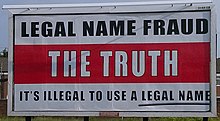
The freeman on the land movement (sometimes spelled freeman-on-the-land or abbreviated as FOTL[2]), also known as the freemen of the land, the freemen movement, or simply freemen, is a loose group of individuals who adhere to pseudolegal concepts and conspiracy theories implying that they are bound by statute laws only if they consent to those laws.[3] Freemen on the land are mostly present in Commonwealth countries. The movement appeared in Canada in the early 2000s, as an offshoot of the sovereign citizen movement which is more prevalent in the United States.[4][5][6][7]
The name "freeman on the land" describes a person who is literally a "free man" on the land where they live.[8] Movement members believe that they can declare themselves independent of the government and the rule of law, holding that the only "true" law is their own idiosyncratic interpretation of "common law".[3] Freemen on the land also advocate schemes to avoid taxes which they consider to be illegitimate. In Canada, courts and scholars use the technical phrase "Organised Pseudolegal Commercial Arguments" (OPCA) as an umbrella term for freemen on the land, the precursor "Detaxer" movement, sovereign citizens, their pseudolegal theories and the vexatious litigation based on them.[9]
Freeman on the land arguments are legally baseless. Besides Canada, freemen on the land's pseudolegal claims have been argued in the courts of Australia, the United Kingdom, New Zealand and Ireland but have always been rejected.[2][10][11] The movement's influence peaked in Canada during the late 2000s and early 2010s; it has since declined significantly.[12]
- ^ Kelly, Jon (11 June 2016). "The mystery of the 'legal name fraud' billboards". BBC News. Retrieved 2 September 2019.
- ^ a b Stocken, Shelley (8 July 2016). "The seriously weird beliefs of Freemen on the land". News.com.au. Australia: Nationwide News Pty Ltd. Archived from the original on 9 May 2017. Retrieved 4 April 2021.
- ^ a b "Freemen movement captures Canadian police attention". CBC News. 29 February 2012. Retrieved 27 November 2022.
- ^ Graveland, Bill (18 December 2013). "Freemen-On-The-Land: Little-Known 'Sovereign Citizen' Movement Emerged From Shadows In 2013". HuffPost. The Canadian Press. Archived from the original on 20 June 2015. Retrieved 20 June 2015.
- ^ Wagner, Adam (30 September 2012). "Freemen on the Land are 'parasites' peddling 'pseudolegal nonsense': Canadian judge fights back". UK Human Rights Blog. 1 Crown Office Row barristers' chambers. Archived from the original on 20 June 2015. Retrieved 20 June 2015.
- ^ Rush, Curtis (5 September 2013). "Sovereign citizen movement: OPP is watching". Toronto Star. Archived from the original on 20 June 2015. Retrieved 20 June 2015.
- ^ "Practice Tips: The Freeman-on-the-Land movement". The Law Society of British Columbia. Winter 2012. Archived from the original on 17 April 2015. Retrieved 20 June 2015.
- ^ Rothschild, Mike (14 October 2013). "The Legal Gibberish of 'Freeman on the Land'". Skeptoid. Retrieved 15 November 2022.
- ^ Netolitzky, Donald J. (2019). "After the Hammer: Six Years of Meads v. Meads". Alberta Law Review. 56: 1167–1185. doi:10.29173/alr2548. ISSN 1925-8356. Retrieved 20 January 2022.
- ^ Netolitzky, Donald (3 May 2018). A Rebellion of Furious Paper: Pseudolaw As a Revolutionary Legal System. Symposium "Sovereign Citizens in Canada". Montreal: Centre d’expertise et de formation sur les intégrismes religieux et la radicalisation (CEFIR). doi:10.2139/ssrn.3177484. ISSN 1556-5068. SSRN 3177484.
- ^ Adam Wagner (16 November 2011). "Freemen of the dangerous nonsense". law.com. Legal week. Retrieved 3 February 2022.
- ^ Netolitzky, Donald J. (1 August 2022), The Dead Sleep Quiet: History of the Organized Pseudolegal Commercial Argument Phenomenon in Canada – Part II, Alberta Law Review, SSRN 4161959, retrieved 27 November 2022